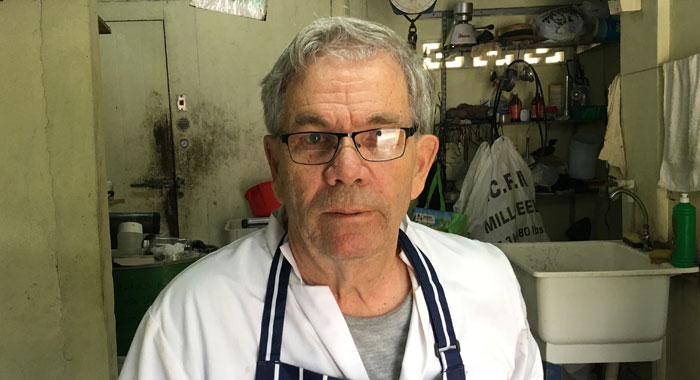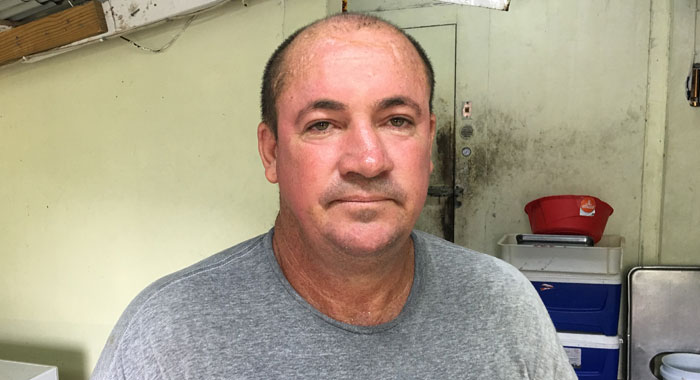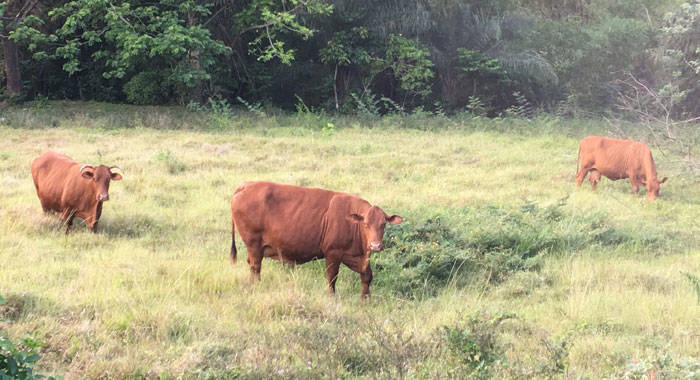One of St. Vincent and the Grenadines’ leading butchers says that there is a shortage of cattle in the country amidst exports to Grenada.
Richard Gibson, who has been in the meat business for 59 years, including decades in England, said St. Vincent is struggling to meet the local demand for beef after the spike in consumption last Christmas.
Gibson, who is owner of the award winning Midway Butchers at Lowmans Hill, told iWitness News that his agents, who buy cattle which they slaughter to supply him with beef are struggling to meet the demand.’
“Over the Christmas period, a lot of cattle were killed in the high peak period and at the same time a lot of animals went out to Grenada,” said Gibson, who does not do his own slaughtering, but hires agents to do so.
With the export of some 183 head of cattle to Grenada in March, St. Vincent was expected to reach almost half of its export target for 2019, before the end of the first quarter of the year.
In the seven years since the programme began, SVG has become the largest
exporter of livestock in the Organisation of Eastern Caribbean States.

But Gibson told iWitness News that beef from the cattle sold to Grenada is being exported to Florida as organic meat and are, therefore, fetching a higher price.
“So why can’t we do the same thing in St. Vincent here and sell a bit of organics? Why can’t we have a slaughter house in St. Vincent kill the animal ourselves, supply work for our people here and if Grenada wants to come and by dead weight animal, let them come up and do that?” Gibson told iWitness News.
Andy Davis, of Arnos Vale, a butcher who supplies Gibson with meat, says that they are feeling the pressure.
“Right now we have a shortage of cattle, especially bulls and big cattle. We can’t get because of this Grenadian buying out all of the cattle in St. Vincent now and taking them out and even the small ones now. They are taking out the small ones,” he told iWitness News on Friday.
“I have been searching for the past two days now and can’t get any cattle to buy. I had cattle that I had given out to mind [that] I had to take back and slaughter, just to keep the market going,” said Davis, who has been a butcher for more than 30 years.
He said that some people are saying that the Grenadian buyer is paying more but some are saying that is not the case.
“I can’t say. I have not been in contact with him personally to see how he is buying or anything like that. So I can’t say if he is paying more or anything like that,” Davis told iWitness News.
He said that to address the situation, the country should limit the number and size of cattle that are exported for the next two or three years to allow the herds to recover.
Davis said that some farmers who traditionally had large numbers of cattle in large pastures are getting rid of them, presumably with a view to entering the medical marijuana industry.
“And a lot of the older people who use to rear cattle, they are not rearing cattle now and the young people are not taking it up on their own to do that now.”
He said that some young people do not want to do hard work and complain
that cattle rearing is hard.

Davis told iWitness News that in the year before the shortage, he would get about 500 pounds of meat from each cattle that he slaughtered.
“And right now, things are down to around 200-300 pounds,” he said, adding that this means that the animal is not mature.
However, farmers are demanding more for these immature bovine.
“A lot of people with those small animals that size, they want good money for it. So the price is really expensive, some of them,” Davis said.
He said that on average, a cattle that would yield 500 pounds of meat will sell for around EC$2,500 as a live animal, if the butcher is to make a profit.
However, farmers are asking for between EC$1,500 and EC$1,800 for a younger cattle — which yields 200 pounds or less of meat.
Meanwhile, Gibson explained the knock-on effect of the shortage of cattle in St. Vincent.
He said that his business supplies a lot of restaurants and caterers, in
addition to producing about 4,000 beef burgers a week and about 300 pounds of
minced meat and a lot of steaks.

Gibson told iWitness News that his suppliers used to bring carcasses of between 500 and 550 pounds.
However, recently, they have been fluctuating between 270, 250, and 220 pounds.
“… because all the large animals have gone to Grenada and the young ones are being killed out,” Gibson said.
“So when we are finished killing these young ones, there is no stock to build up so there will be a great loss to the people of St. Vincent,” he said, adding that this will impact the businesses that he supplied.
He said he usually hangs his meat in his fridge for two to three weeks to allow it to mature so that the meat could be more tender and that marbling can occur.
“I can’t do it now so I am refusing to sell steak to anybody who wants steak because it will be tough and all the young cattle that are coming through, there is no fat on them,” said Gibson, who told iWitness News that he would rather not sell meat than lose his reputation of selling top quality meat that many high-end customers are looking for.
“So, even the meat to make the beef burgers, there is no fat on it so if you are not careful, the beef burgers will crumble when you are cooking them and they will fall to bits,” he said.
Gibson said he has spoken to the agriculture minister, Saboto Caesar, about the situation several times.
“You must realise that the gestation period for cattle is nine months and to get to slaughter-house-quality is between 24 and 30 months old. So that gap has to be there to get good quality beef. So where is the next generation of beef coming from when you are now selling out all the young cattle?”







This is true, I know the person from Grenada buying out cattle from St Vincent and he gets top price for the originic beef
You are so wrong with this statement. If you really knew the person you would not be saying this. The farmers are willingly selling their cattle, these white vincy butcher’s acting as if the Grenadian butcher just coming and take them. Please. Pure Jealousy I’m sensing here. Bad mind ppl.
Why you need to apply the label white to the butcher I do not know, perhaps just a touch of racism.
For your information the butcher in Grenada is a white French Canadian.
Instead of feeling some inferiority you should try and educate your mind and then perhaps your commentary will improve.
If our cattle can fetch higher prices overseas, so be it.
Most of our people always have been unable to afford eating beef on a regular basis, a phenomenon having nothing to do with the Grenada trade.
Imported beef would also be much cheaper than it is if the government removed its sky high import duties.
It makes no sense sell out all the cattle and import beef because its cheaper,why not have the slaughter house and sell the organic beef ourself,we have mr Gibson who us very much verse on meat and the cuts,why import,in my opinion all these imported stuff is what is causing most of the cancer that is affecting our people,let us enjoy a piece of organic meat when we could afford it,I am not saying don’t export,but we must also look to replenish and maintain the population of cows
AGREE WITH YOU 1000 PERCENT ……WE MUST SUSTAIN AND PRESERVE PRECIOUS COMMODITIES . WHICH WILL ALSO FUEL JOBS …..THE TECH WORLD HAVE LEAD US TO FORGET OUR ROOTS WHICH IS THE SOIL , LAND AND SEA . SUPPLEMENT THIS WITH TOURISM AND THE POSSIBILITIES ARE ENDLESS .
Imported beef is certainly not cheaper but is of a higher quailty if purchsed before it has langished in a supermarket freezer for months.
Why anyone overseas would want to buy beef from our local breed of inferior cattle that have been fed nothing but grass (and no corn or other food that would make the cuts more flavourful), except to convert to dog and cat food, is incomprehensible.
Aging beef in a refrigerated facility for 2-3 weeks also is insufficient to produce a quality product from a quality breed of cattle like Black Angus (that we don’t even raise in SVG) that should be aged for 45 days.
Finally, any nutritionist would say that beef is the worst protein food to consume. It is far healthier to eat fish, goat meat, and turkey than beef or even the fatty low grade chicken sent to our shores from America.
IN MOST COUNTRIES THESE NATURALLY (ORGANICALLY) RAISED CATTLE WOULD BE PRIZED AND PRIME MEAT ………BUT INSTEAD WE GIVE AWAY OUR PRIZED COMMODITIES FOR OTHERS TO REAP THE REWARDS AND BENEFIT SUBSTANTIALLY FROM IT …….SMH VERY SAD
TO MAKE MATTERS WORST THE YOUNGER GENERATIONS SELDOM HAVE ANY OR NO INTEREST TO FARM OR BREED ANIMALS WHICH CAN REAP VERY HIGH REWARDS AND BE A VERY LUCRATIVE AND PRODUCTIVE MARKET FINANCIALLY
WE THE PEOPLE ARE SELF DESTRUCTING SLOWLY AND BECOMING MORE DEPENDENT ON FOREIGN IMPORTS AND HANDOUTS …..WRONG DIRECTION
Sorry AL but you are writing rubbish again.
When Vincentian cattle arrive in Grenada they are pastured out on flat grass pasture land and run-on to fatten and better them.
How anyone can apply the label ‘organic’ I am not sure. To be such worming for the prevention of liver fluke worm and stomach worms would not be allowed. No added growth hormones, no administered antibiotics. No medicines of any kind. I am not sure if failing to treat animals would in fact put humans at risk or not.
In Grenada the finished carcass is hung for 21 days to mature the meat which tends to tenderise and make it more flavourful. I have been in his chill room and inspected the product.
The butcher there is French Canadian and he is really good at what he does. I have bought meat and meat products from him. Really excellent everything that he does.
I have also bought meat from Richard Gibson in SVG and also from his shop in the UK when he was there. Richard is a master butcher and probably the most reliable spokesman regarding beef in SVG. He is the only person in SVG who actually knows how to properly butcher and portion a carcass. I have also been in his chill room several years ago and can vouch for his procedures.
Most of the commentators to this article know nothing at all about butchery and beef in particular. Or about the breeding or husbandry of cattle.
One of the problems with Vincentian beef is that farmers refuse to have the male calves castrated. Castrated cattle grow and mature much earlier than un-castrated beasts. The castrated cattle mature earlier, taste better, and have more fat marbling.
Cattle from higher pasture land where it is cooler will produce a better carcass than the lowland cattle.
Overall better beef can be bought from Argentina where far superior cattle and methods of husbandry are employed.
Vincentian beef in general is a rather inferior product but the Grenadians do manage to upgrade it somewhat. Poor Richard has been fighting a losing battle since he returned to SVG.
FIRST OFF G.T. I AM NOT COMPARING OUR BEEF TO OTHER PRIME AND MORE SCIENTIFICALLY GROWN BEEF AROUND THE WORLD …………..I AM SOLELY SPEAKING ON WHATS BEST IN OUR INTEREST AND GOOD FOR OUR ECONOMY PLUS EMPLOYMENT ALONG WITH FEEDING OUR FAMILIES ………..THATS IF YOUR TINY BRAIN CAN COMPREHEND THAT .
WHO CARES ABOUT ALL THAT RUBBISH AND ANALYTICS ABOUT BEEF YOU WASTED 15 MINUTES OF YOUR TIME TO RESEARCH ONLINE TO WRITE .
THE AVERAGE LOCAL FARMER DONT CARE .
AL it’s worse not worst.
THANK YOU JOSE …..BTW HOW YOU DID THE HYPHEN OVER THE “E” IN YOUR NAME LOL
IN MOST COUNTRIES THESE NATURALLY (ORGANICALLY) RAISED CATTLE WOULD BE PRIZED AND PRIME MEAT ………
AL you really must stop making such silly comments about something you know nothing whatsoever about.
Vincentian cattle are not raised organically they are attended to by vets from time to time and farmers administer worming and antibiotics to them on a fairly frequent basis.
Cattle are also grazing at Argyle between the airport and the coast where the ground and vegetation is highly contaminated with oil and diesel spillage, and dumped and spilt bitumen products from the machinery department from when the airport was under construction.
Beef cattle need 2 gallons per 100 pounds of body weight during Saint Vincent’s hot weather.
Milk or lactating cattle need about 80 gallons of water a day, in many parts of SVG cattle are kept where there is no river and no running water on site. I have seen the owners bring several 5 gallon tubs of water in a pickup truck and give that to a dozen cattle, simply not enough for the animals. In the US and Europe they provide their cattle with troughs of water which refill as the cattle drink. In civilised countries Vincentian farmers would be prosecuted for cruelty and banned from keeping cattle.
There appears to be no animal cruelty oversight in SVG.
Lack of water makes a rubbish meat carcass, tough and rubbery meat, through lack of hydration.
Maybe we should take a leaf from the Cuban nutrition book. Cuba is currently suffering chronic food shortages and is in crisis trying to feed its people. So they are now farming ostrich, crocodile and a large rodent[rat] called a hutia.
I have eaten ostrich and crocodile but not the rat., like many Vincentian I have eaten Manicou.
The manicou if you are American, is the opossum. It should not be eaten as the Bible classes it in the category of unclean meats. But we all know Vincentians will just eat anything that moves, ASK RALPH.